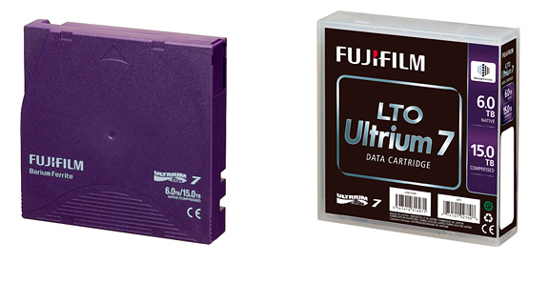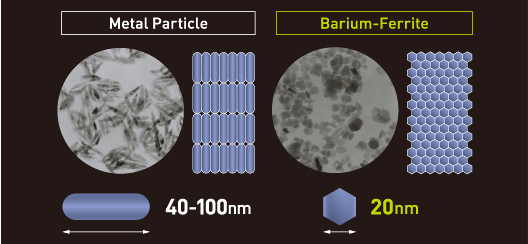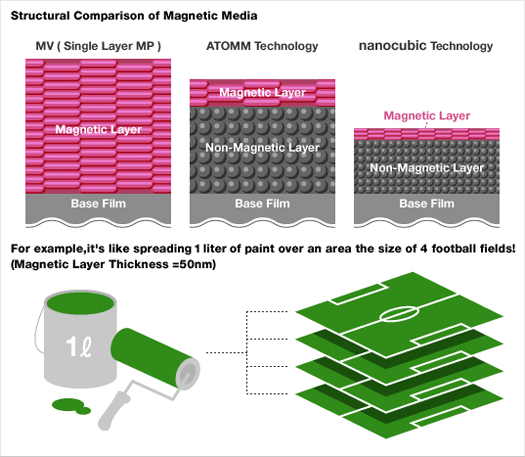FujiFilm Launches LTO-7 Cartridge
Using Barium-Ferrite magnetic particules and NanoCubic technology
This is a Press Release edited by StorageNewsletter.com on December 11, 2015 at 2:53 pmFujiFilm Corporation announced the launch LTO Ultrium 7 data cartridge (LTO-7).
Adhering to the 7th generation LTO Ultrium standards(1) for magnetic tape media, the LTO-7 will allow for backup and archive of large volumes of data, high-speed data transfer at 750MB/s- (300MB/s-. for non-compressed data), and offer a storage capacity of 15TB (6TB for non-compressed data.)
Recent technological developments have caused an exponential increase in the quantity of data generated worldwide. Such developments have included increases in data volume following the emergence of high-definition 4K and 8K video; the spread of supercomputer use in the areas of genetic analysis and drug development; and advances in the IoT (Internet of Things). At the same time, ‘cold-data’, or data that is rarely accessed as time passes – is estimated to account for over 80% of all data. As the utilisation of accumulated big data rapidly increases, so does the need for reliable and cost effective long term storage of such data for future use. The use of magnetic tape is gaining in popularity, especially at major data centers, thanks to its storage capacity, portability, energy efficiency, TCO and suitability for long-term storage. The demand for magnetic tape is expected to increase further.
BaFe (Barium-Ferrite) magnetic particles offer outstanding recording/retrieval performance and are suitable for long-term storage. The high coercivity, high signal to noise ratio and superior frequency characteristics make BaFe magnetic particles a technology that can help further increase the capacity of magnetic tape. Capitalising on years of R&D investment and expertise, the company was the first in the world to commercialise magnetic tapes using BaFe magnetic particles for enterprise systems in 2011. In 2012, the firm introduced LTO Ultrium data cartridge which employed BaFe magnetic particles. Foreseeing the limitations posed on capacity by legacy metal magnetic particles, the prevalent technology at the time, company’s early commercialisation of magnetic tape using BaFe magnetic particles has allowed the company to lead the market. Leveraging sophisticated BaFe magnetic particle technology, BaFe particle-based magnetic tape shows stable and excellent performance regardless of the drive employed.
With LTO-7, the company has further developed its proprietary BaFe magnetic particle technology and NanoCubic technology, (2) expanding storage capacity to about 2.4 times that of LTO-6 at 15TB for compressed data and making data transfers approximately 1.9 times faster, reaching 750MB/s for compressed data. Compared with LTO-5, LTO-6 capacity and transfer speed have increased by 1.7 and 1.1 times, respectively. The increase in performance from LTO-6 to LTO-7, however, vastly surpasses this gap. In order to boost the product’s storage capacity, the company has achieved high-precision magnetic particle dispersion, has made the magnetic layers thinner, and has reduced minor defects for a better error rate. In this way, the firm has increased recording density by more than two times compared to LTO-6. Furthermore, appropriate material design has allowed to boost reliability, durability and tracking performance, while at the same time making the tape layers thinner and improving storage capacity. Moreover, BaFe magnetic particles offer low variance in terms of magnetic properties, offering greater stability, and the ability to reliably store data for over thirty years has been verified.
The company is engaged in technological development with the aim of further expanding the capacity of magnetic tapes using BaFe magnetic particles. The micronisation of magnetic particles is a major factor in improving the recording density of magnetic tapes. By combining proprietary particle formulation design and particle formation processes, Fujifilm has commercialised BaFe magnetic particles that are microscopic in size but at the same time exhibit uniform characteristics with little unevenness.
In April 2015, Fujifilm in cooperation with IBM demonstrated the potential of achieving a data cartridge with 220TB of uncompressed capacity using an advanced prototype of BaFe magnetic particles. 220TB is the highest capacity in the world for coated magnetic tape. (3)
Since the launch of LTO-1 in 2000, the company has been manufacturer in the development of high-capacity magnetic tape and is engaged in the constant pursuit of high performance and high quality as the world’s top manufacturer (4). The firm will continue to develop and provide performance, quality media and services to satisfy customers’ needs and expectations, thereby helping to solve social issues.
Features:
-
Allows high-speed data transfers at 750MB/s and offers a maximum recording capacity of 15B
-
Tapes are 12.65 mm-wide and can record 3,584 tracks, reaching 15TB for compressed data (or 6TB for non-compressed data). For example, LTO-7 allows recording two hours in the ‘4K DCI 24p 10bit’ format that is used when editing 4K video. Also, the 32 channel magnetic heads in the tape drive allow for high-speed data transfer reaching 750MB/. for compressed data (or 300 MB/s for non-compressed data). The entire capacity can be transferred and restored in 5.6 hours.
-
High recording density achieved by incorporating proprietary BaFe magnetic particle and NanoCubic technologies
-
LTO-7 employs BaFe magnetic particles, which were first commercialised by Fujifilm. Proprietary NanoCubic technology is designed to maximize the magnetic properties of BaFe magnetic particles.
-
Optimal for data centers and the cold storage of high-definition video.
-
LTO-7, with its high capacity and capability to store data for over 30 years, is optimal for economically storing large quantities of cold data over the long term. For example, assuming that 1PB of data increases at a yearly rate of 55% and reaches 52PB over nine years, the total cost incurred to store the data will be less than one sixth of the cost that would be incurred if using HDD. (5) With the magnetic tape, which is capable of being managed offline, valuable data can be stored safely and securely with minimum risk for data damage or loss due to system failures, viruses and cyber-attacks.
-
Supports LTFS: LTFS is an open-standard file system format implemented from LTO-5 onwards. The presence of a meta-data area on the tape itself allows customers to avoid dependence on vendor-specific backup software, and allows for cross-platform data exchanges. Data stored on magnetic tapes can be handled as files just as in the case of data on a HDD.
Key specifications:
| Capacity (at 2.5x compression) | 6TB (15TB) |
|---|---|
| Transfer rate (at 2.5x compression) | 300MB/s (750MB/s) |
| Number of tracks | 3,584 (32 track heads) |
| Cartridge memory | 130,816 bits (16,352 byte); Internal EEPROM |
| Tape width | 12.65mm |
| Tape thickness | 5.6μm |
| Tape length | 960m |
(1) Linear Tape-Open, LTO, the LTO logo, Ultrium and the Ultrium logo are registered trademarks of Hewlett Packard Enterprise, IBM and Quantum in the United States of America and in other countries.
(2) Fujifilm’s proprietary ultra-thin layer coated magnetic tape technology allows high-density, high-capacity magnetic recording and consists of; nano-particle technology, which allows the micronizing of magnetic particles; nano-coating technology, which allows ultra-thin coating; and nano-dispersion technology, which allows the uniform dispersion and arrangement of micronized magnetic particles.
(3) As of November 18, 2015; data by Fujifilm.
(4) Manufacturer share; data by Fujifilm.
(5) Data provided by U.S. research agency The Clipper Group. All costs, including drive, server and other initial installation costs, maintenance costs and electricity cost are less than one sixth of those incurred if using HDDs.
















 Subscribe to our free daily newsletter
Subscribe to our free daily newsletter

